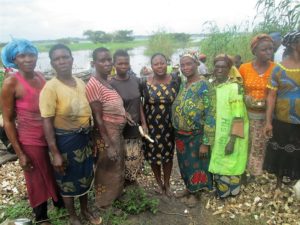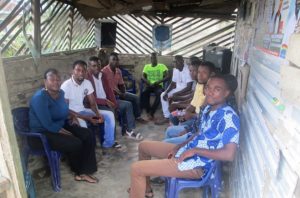Conflict-affected settings pose several challenges for researchers conducting fieldwork. These places can be especially difficult for female researchers because their gender identity could place them in vulnerable situations during both war and peace.1Marie E. Berry, War, Women, and Power: From Violence to Mobilization in Rwanda and Bosnia-Herzegovina (New York: Cambridge University Press, 2018); John Idris Lahai, “Gendered Battlefields: A Contextual and Comparative Analysis of Women’s Participation in Armed Conflicts in Africa,” Peace and Conflict Review 4, No. 2 (2010): 1–15. Such difficulties are likely to be especially severe where the patriarchal system is dominant, as is the case in some parts of Africa.
This essay is based on my experience conducting my African Peacebuilding Network (APN)-supported field research in local communities in the Niger Delta region of Nigeria. It describes the challenges I encountered as a female researcher navigating a difficult environment. My project was titled “The Curse of Oil: Unpacking the Challenges to Food Security in Nigeria’s Niger Delta Region” and to carry out fieldwork, I had to gain access to conflict-affected local communities, sometimes negotiating with local guides and gatekeepers and engaging with respondents suffering from research fatigue, all the while being attentive to ethical requirements to “do no harm.” Ethical challenges in conflict-affected settings can impact the effectiveness of research methodologies, quality of data, and the integrity of analysis and findings and therefore need to be addressed.2Ismail Rashid, “The Ethics of Fieldwork in Conflict-affected Settings: What Works Best, How And Why?” Lecture delivered at the African Peacebuilding Network Research Methods Workshop, University of Ghana, Legon, Accra, Ghana.
Female researchers might find themselves assuming multiple identities to navigate the research site. Assuming such identities may pose an ethical dilemma since it may be perceived as deception. At the same time, insecurity in conflict-affected settings often requires reliance on the researcher’s sense of judgment on the best strategies for navigating such terrains. As Elisabeth Wood put it, following abstract rules will not be sufficient.3Elisabeth Jean Wood, “The Ethical Challenges of Field Research in Conflict Zones,” Qualitative Sociology 29, no. 3 (2006): 73–386. Despite the ethical challenges that conflict settings pose, conducting fieldwork in such places provides great opportunities to generate data essential for designing post-conflict peacebuilding activities. However, researchers must give top priority to their personal safety at all times, as no research is worth risking anybody’s life.
Insights from Fieldwork in the Volatile Niger Delta

During my fieldwork in the Niger Delta, my identity as a female researcher made it necessary to be more careful in negotiating access, gaining entry, and obtaining reliable data. While some local contacts offered advice on the kind of identity that would most likely motivate research subjects to grant interviews, allow access to reliable data, and minimize risks to both the researcher and respondents, I was aware of the need to keep within the requirements of ethical fieldwork practice. Even at that, I was also mindful of respondents’ apathy toward researchers as a result of decades of hardship, deprivation, marginalization, research fatigue, and dashed hopes after initial expectations that research outcomes would lead to a change in their living conditions. In the words of a respondent in one of the communities: wetin ya research go change? We don talk and talk to you researchers for years. Who e epp? (What can your research change? We have provided information about our situation to researchers for many years. How has that helped us?).
It is therefore essential for researchers to be cognizant of this and find creative ways to elicit, verify, and validate the information received. Some of our local contacts had described how local youth attack outsiders, particularly oil company officials and government contractors, demanding money from them in exchange for permission to operate in the community. These belligerent youth threaten to disrupt their activities unless they accede to such demands. Therefore, we only approached the field after we had familiarized ourselves with the possible risks and devised emergency plans.
During fieldwork in Bayelsa state, before getting to a particular community, we learned of a rumor circulating that officials of one of the operating oil companies were coming to distribute compensation money to villagers. Upon our arrival, some members of the community assumed that we were the oil company officials. This caused apprehension among members of the research team as to the likely consequences of the rumor about our identity. We also recognized the need to be security-conscious and adopted some precautionary measures.
During focus group discussion (FGD) sessions with the youth, one of the participants, apparently acting on the basis of the rumors, stood up and suddenly exclaimed, “You are an official of the oil company.” I instantly denied it, but he appeared not to be convinced. He asked me to produce my identification card. Unfortunately, I had left it behind in my hotel room in my hurry to keep our appointment with the group. However, I managed to convince him that I was not an oil company official without betraying any sign of being scared and he eventually calmed down, after which we continued with the group discussion.
After that incident, I learned to be more careful when interviewing the youth and made such interviews brief. In one of the communities in Rivers state, my research assistants and I narrowly escaped been kidnapped. It took the foresight of my research assistants, acquired through vast experience working in such communities, to sense the danger and subtly alert me of the need to quickly leave the place. The project officer of one of the foremost NGOs working in these communities, Environmental Rights Action (ERA), described to me how he and officials of the British Council were kidnapped by local youth when they visited one of the oil communities in Rivers state to access oil spills sites. As it turned out later, some of the youth involved in their abduction were his childhood friends.
Roles of Local Contacts in Tackling Ethical Challenges in Conflict-Affected Settings
Accessing communities in the Niger Delta presents particular challenges. It is important to engage with credible local contacts who can facilitate entry into the communities. One has to learn to avoid local contacts or gatekeepers that operate on the assumption that fieldwork is a kind of money-making venture. In my case, I spent days in Port Harcourt trying to identify reliable local contacts who could facilitate my entry into selected communities.

Before visiting the research sites, I was inundated with stories of how risky and volatile oil communities in the Niger Delta can be, with reports of violence, kidnapping, armed robbery, and murder. Some went as far as suggesting that I consider the option of carrying out interviews by phone. After careful consideration and discussions with ERA, a local NGO with a solid track record in advocacy for human and environmental rights in the Niger Delta, I decided to work with their officials.
Local contacts play vital roles in facilitating access for researchers to volatile research sites and obtaining reliable information. In Delta state, an official of the Ministry of Agriculture provided assistance in accessing a community that had been involved in a protracted crisis with neighboring communities over conflicting claims to oil-rich land. The official, who worked as an extension officer for the empowerment of local farmers and was well known locally, became my research guide. Given the tense security situation, I doubt if the research subjects would have cooperated with me without his presence.
Conclusion
Although there is no one-size-fits-all approach, since each conflict-affected environment may present distinct challenges for researchers conducting fieldwork, the ability of female researchers to navigate conflict-affected settings requires being creative, reflexive, and adaptive. One also needs to quickly develop a capacity for identifying and working with credible local contacts. It is important that any strategies adopted do not expose the researcher and subject to security risks or situations capable of compromising the quality of information obtained in the course of fieldwork. It is also crucial that researchers operate with high ethical standards, look and dress appropriately, and be respectful and sensitive to local cultures, contexts, and practices.

